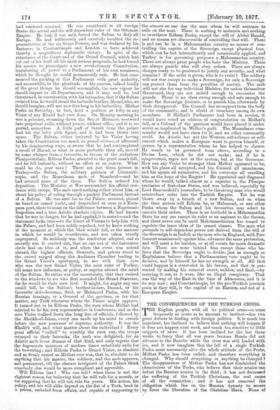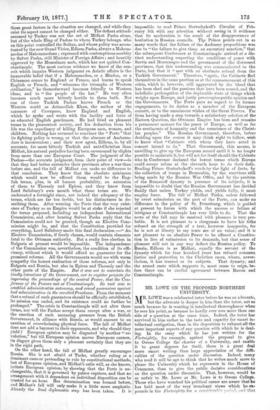THE CONSEQUENCES OF THE .1.11.1iKISH CRISIS.
THE English people, with all its political sense—a sense frequently so acute as to amount to instinct—has two great defects in dealing with foreign politics. It is much too impatient, too inclined to believe that nothing will happen if it does not happen next week, and much too sensitive to little snippets of news. It has been inclined for the last three weeks to fancy that all was peace because Russia did not advance to the Danube while the river was still loaded with ice, and it now imagines that the fall of a single Turkish Pasha must necessarily alter the whole attitude of the Porte. Midhat Pasha has been exiled, and therefore everything is changed. Why should everything or anything be changed ? The disappearance of Midhat Pasha has not diminished the obauvinisme of the Turks, who believe that their armies can defeat the Russian armies in the field ; it has not decreased the suffering of the Turkish Christians, the real cause of all the commotion ; and it has not removed the obligation which lies on the Russian dynasty to secure by force the liberation of the Christian Slays. None of these great factors in the situation are changed, and while they exist its aspect cannot be changed either. The defiant attitude assumed by Turkey was not the act of Midhat Pasha alone, but of the whole Ring of Pashas to whom Turkey belongs, who on this point controlled the Sultan, and whose policy was accen- tuated by the new Grand Vizier, Edhem Pasha, always a Moham- medan of Mahommedans ; expressed with contemptuous acerbity by Saf vet Pasha, still Minister of Foreign Affairs ; and heartily approved by the Mussulman mob, which has not quitted Con- stantinople. The most curious evidence we know of the con- ceit which impairs Western judgment on Asiatic affairs is the immovable belief that if a Mahommedan, or a Hindoo, or a Chinaman comes to England or France, and learns to speak English or French, and "witnesses the triumphs of Western civilisation," he thenceforward becomes friendly to Western ideas, and to "the people of the hat." He very often becomes much more bitterly hostile to them both. Not one of these Turkish Pashas knows French or the Western world as Azimoollah Khan, the author of the massacre of Cawnpore, knew England and English, which he spoke and wrote with the facility and force of an educated English gentleman. He had lived on pleasant terms in the pleasantest society, and his deduction from his life was the expediency of killing European men, women, and children. Nothing has occurred to convince the "Porte " that its fighting policy is wrong, or that the absence of Ambassa- dors is inconvenient ; and their new agent, Edhem, is, by all accounts, far more bitterly Turkish and anti-Christian than Midhat, his natural prejudice having been envenomed by slights from more than one European Court. The judgment of the Pashas—the accurate judgment, from their point of view—is that they had better surrender their provinces after a war than before one, and the fall of Midhat can make no difference to that conclusion. They know that the absolute minimum which would now be offered them would be the Eng- lish terms, plus, in all human probability, an extension of them to Thessaly and Epirus, and they know from Lord Salisbury's own mouth what those terms are. We underrated a fortnight since, not indeed the adequacy of the terms, which are far too feeble, but his distinctness in de- scribing them. After warning the Porte that the very exist- ence of Turkey as an Empire would be at stake if she rejected the terms proposed, including an independent International Commission, and after hearing Saf vet Pasha reply that the Commission could not be granted, though an Elective Com- mission might be, and that the Constitution provided for everything, Lord Salisbury made this final declaration :—" An Elective Commission, if freely chosen, would contain elements fatal to the Ottoman authority. But a really free election in Bulgaria at present would be impossible. The independence of the Commission was, nevertheless the condition of its effi- ciency, without which it would afford no guarantee for the promised reforms. All the Governments would see with warm sympathy the honest realisation of those reforms, not only in Bulgaria and Bosnia, but also in Epirus and Thessaly and the other parts of the Empire. But it was not to ascertain the kindly intentions of the Government, nar to register projects for improving the proceedings of the central Power, that the Con- ference of the Powers met at Constantinople. Its task was to establish administrative autonomy, and sound guarantees against bad administration in the revolted Provinces. From the moment that a refusal of such guarantees should be officially established, its mission was ended, and its existence could no further be prolonged." The crisis in Constantinople will not alter these terms, nor will the Pashas accept them except after a war, or the exertion of such menacing pressure from the British Government, in alliance with Russia, as would amount to an exertion of overwhelming physical force. The fall of Midhat does not add a bayonet to their opponents, and why should they yield ? European opinion may be disgusted by another "re- volution," but till European opinion moves European cannon, its disgust gives them only a pleasant certainty that they are in the right path. On the other hand, the fall of Midhat greatly encourages Russia. She is not afraid of Turks, whether ruling as a dominant caste or pretending to rule by constitutional methods, but of European opinion, and Midhat's exile will, as she knows, irritate European opinion, by showing that the Porte e Is un- changeable, that it is governed by palace caprices, and that no arrangement with it dependent on individual disposition can be trusted for an hour. Her determination was formed before, and Midhat' s fall will only make it a little more emphatic. impossible to read Prince Gortschakoffs Circular of Feb.. raary 5th with any attention without seeing in it evidence that its moderation is the result of the disappearance of hesitation in Russian councils. Tite Prince points out in so many words that the failure of the Andrassy propositions was due to "the failure to give them an executory sanction," that the subsequent Conference at Constantinople arrived at a dis- tinct understanding respecting the conditions of peace with Servia and Montenegro and the government of the distressed provinces, that this understanding was communicated to the Porte, but that it "met with an obstinate refusal from the Turkish Government." Therefore, "again, the Cabinets find themselves in the same position as at the commencement of this crisis, which is, however, still aggravated by the blood that has been shed and the passions that have been roused, and the indefinite prolongation of the deplorable state of things which weighs upon Europe, and justly preoccupies public opinion and the Governments. The Porte pays no regard to its former engagements, to its duties as a member of the European concert, or to the unanimous wishes of the Great Powers. Far from having made a step towards a satisfactory solution of the Eastern Question, the Ottoman Empire has been and remains a permanent menace for the peace of Europe, as well as for the sentiments of humanity and the conscience of the Christ- ian peoples." The Russian Government, therefore, before deciding upon the course it may think right to follow, wish to know what "Cabinets with whom they have acted in concert intend to do." That Government, this means, is unwilling to give up the European accord until it is no longer possible to maintain it, but will act for itself should the Cabinets who in Conference declared the lowest terms which Europe could accept refuse at the eleventh hour to do their duty. Reading Prince Gortschakoff's words by the light of facts, by the collection of troops in Bessarabia, by the exertions still being made by the Russian War Office, and by the position of the Romanoff dynasty in presence of its subjects, it is impossible to doubt that the Russian Government has decided finally that unless Turkey yields, and yields fully, it must employ force. The fall of Midhat Pasha, unless followed by overt submission on the part of the Porte, can make no difference in the policy of St. Petersburg, which is guided at present by forces with which the success or failure of intrigues at Constantinople has very little to do. That the news of the fall may be received with pleasure is very pro- bable. It is not pleasant to a clergyman to have his tithe refused on the strength of a text, however inapposite, for he is not at liberty to say texts are of no value; and it is not pleasant to an absolute Power to be offered a Constitu- tion in lieu of submission to its demands, but that sense of pleasure will not in any way deflect the Russian policy. To Russia, Edhem is as Midhat, equally the servant of the dynasty which for four hundred years has refused commen justice and protection to the Christian races, whom, never- theless, it has treated as its subjects. That dynasty, and the armed caste which supports it, must cease to reign, be- fore there can be cordial agreement between Russia and Constantinople.



































 Previous page
Previous page